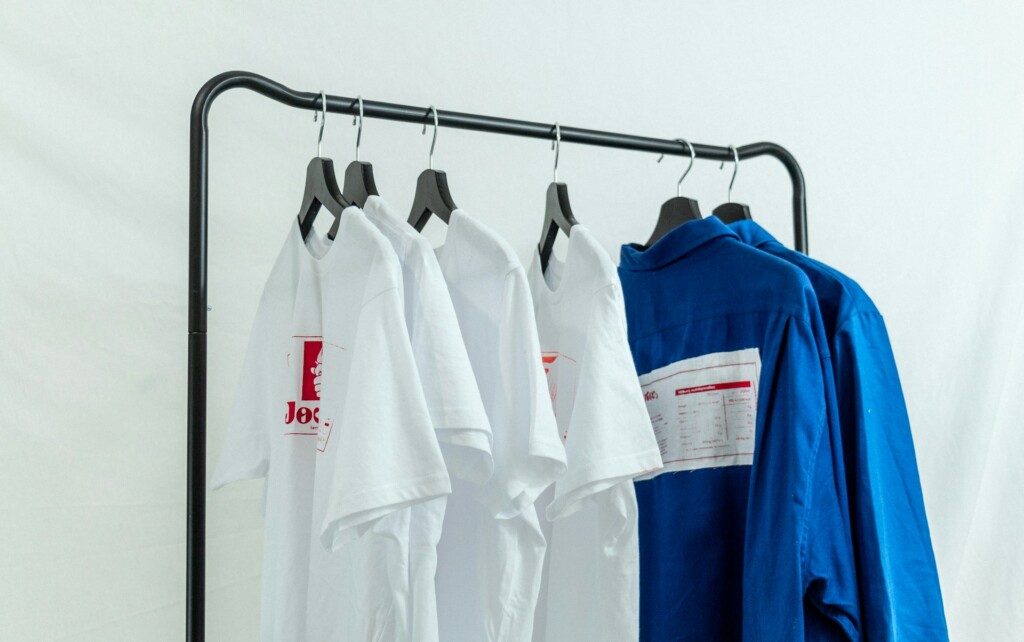Custom-branded apparel has evolved from simple promotional giveaways into a sophisticated marketing strategy that drives brand recognition, builds customer loyalty, and generates measurable business results.
Companies across industries are discovering that well-designed custom clothing serves as a powerful tool for increasing visibility, strengthening team cohesion, and creating lasting connections with their target audience.
This comprehensive guide explores how branded apparel can transform your marketing efforts and provide actionable strategies for implementing custom clothing into your business promotion plan.
From understanding the psychological impact of wearable marketing to measuring return on investment, you’ll learn everything needed to leverage this versatile marketing channel effectively.
The Psychology Behind Wearable Marketing
Creating Emotional Connections Through Branded Apparel
Custom clothing taps into fundamental human psychology by creating a sense of belonging and identity. When customers wear your branded apparel, they become voluntary brand ambassadors, signaling their association with your company’s values and community.
This emotional connection runs deeper than traditional advertising because it involves personal choice and self-expression. Research shows that people form stronger attachments to brands they can physically interact with.
A well-designed custom t-shirt or hoodie becomes part of someone’s wardrobe, creating repeated exposure to your brand message. Unlike digital advertisements that disappear after viewing, branded apparel provides ongoing visibility that reinforces brand recall over time.
Building Trust Through Consistent Brand Presence
Consistent visual branding across all touchpoints builds trust and credibility. When your team wears professional custom clothing featuring your logo and brand colors, it creates a cohesive brand experience that customers remember.
This consistency signals reliability and attention to detail, qualities that translate into increased customer confidence. Companies like Rogue Star have mastered this approach by creating distinctive branded apparel that reflects their unique identity while maintaining professional appeal.
Their custom clothing designs demonstrate how strategic branding can differentiate a company in competitive markets.
Enhancing Brand Visibility and Recognition
Turning Customers into Walking Advertisements
Every piece of branded apparel functions as a mobile billboard, extending your marketing reach far beyond traditional advertising channels. When customers wear your custom clothing in public, they expose your brand to countless potential customers who might never encounter your business otherwise.
This organic exposure carries significant value because it comes with implicit endorsement. People are more likely to trust recommendations from friends and family than traditional advertisements. When someone wears your branded apparel, they’re essentially recommending your brand to everyone they encounter.
Maximizing Exposure at Events and Trade Shows
Custom clothing becomes particularly valuable at industry events, trade shows, and conferences where standing out from competitors is essential. Well-designed branded apparel helps your team remain visible and approachable while creating memorable interactions with potential customers.
Consider creating event-specific designs that incorporate conference themes or locations while maintaining your core brand identity. This approach demonstrates creativity and attention to detail while ensuring your team remains easily identifiable throughout the event.
Strengthening Team Unity and Company Culture
Creating a Sense of Belonging
Custom-branded apparel plays a crucial role in building a strong company culture by creating visual unity among team members. When employees wear branded clothing, it reinforces their connection to the company’s mission and values while fostering a sense of pride in their workplace.
This sense of belonging translates into improved employee satisfaction and retention. Teams that feel connected to their organization’s identity are more likely to provide exceptional customer service and represent the brand positively in all interactions.
Improving Professional Appearance
Professional custom clothing elevates your team’s appearance while ensuring consistent brand representation. Whether your employees work in retail, service industries, or office environments, branded apparel creates a polished, professional image that customers associate with quality and reliability.
High-quality custom clothing also demonstrates that you invest in your team’s professional development and appearance. This attention to detail reflects positively on your company’s overall standards and commitment to excellence.
Driving Customer Loyalty and Engagement
Creating Exclusive Brand Experiences
Limited-edition branded apparel can create excitement and urgency around your brand while rewarding loyal customers. Exclusive designs available only to VIP customers or event attendees generate buzz and encourage deeper engagement with your brand community.
This exclusivity taps into customers’ desire to be part of something special while providing tangible value that strengthens their connection to your brand. Limited releases also create opportunities for social media engagement as customers share photos wearing their exclusive items.
Encouraging User-Generated Content
Branded apparel naturally encourages customers to create and share content featuring your brand. When people wear your custom clothing, they often share photos on social media, creating authentic user-generated content that reaches their networks.
Encourage this behavior by creating branded hashtags, running photo contests, or featuring customer photos on your official social media channels. This approach amplifies your marketing reach while building a community of brand advocates who actively promote your business.
Cost-Effective Marketing Strategy Implementation
Calculating Return on Investment
Custom-branded apparel offers exceptional value compared to traditional advertising methods. While a single advertisement might be seen once, a piece of branded clothing can generate thousands of impressions over its lifetime. This longevity makes custom clothing one of the most cost-effective marketing strategies available.
Track metrics such as brand awareness surveys, website traffic from branded apparel campaigns, and customer acquisition costs to measure the impact of your investment. Many companies find that branded apparel generates significantly more impressions per dollar spent than traditional advertising channels.
Scaling Your Marketing Strategy
Starting with a small selection of high-quality branded apparel allows you to test designs and gauge customer response before investing in larger quantities. Begin with versatile items like t-shirts or polo shirts that appeal to a broad audience, then expand based on customer feedback and preferences.
Consider seasonal variations and special edition designs to maintain interest and encourage repeat purchases. This approach keeps your branded apparel fresh and relevant while providing ongoing marketing value.
Choosing the Right Apparel for Your Brand
Understanding Your Target Audience
Successfully branded apparel starts with understanding your target audience’s preferences, lifestyle, and values. Research what types of clothing your customers wear regularly and which styles align with your brand personality.
A tech startup might choose modern, minimalist designs, while a fitness brand might focus on performance-oriented athletic wear.
Consider conducting surveys or focus groups to gather feedback on potential designs and product types. This research ensures your investment in custom clothing resonates with your target market and achieves desired marketing objectives.
Quality Considerations and Brand Perception
The quality of your branded apparel directly impacts how customers perceive your brand. Cheap, poorly made clothing reflects negatively on your company’s standards and may harm your brand reputation. Invest in high-quality materials and construction that customers will want to wear repeatedly.
Work with reputable suppliers who understand the importance of quality in branded merchandise. Companies like Rogue Star have built their reputation on delivering exceptional custom clothing that meets the highest standards for both design and durability.
Maximizing Your Custom Apparel Investment
Strategic Distribution and Timing
Develop a strategic approach to distributing your branded apparel to maximize marketing impact. Consider giving items such as employee uniforms, customer appreciation gifts, event giveaways, or promotional items for new customer sign-ups.
Each distribution method serves different marketing objectives and reaches different audience segments. Time your apparel launches to coincide with key business events, seasonal trends, or industry conferences. This strategic timing ensures maximum visibility and relevance while supporting broader marketing campaigns.
Integration with Digital Marketing
Combine your custom clothing strategy with digital marketing efforts to amplify results. Feature branded apparel in social media posts, email campaigns, and website content to create cohesive brand experiences across all channels. This integration reinforces your brand message while showcasing your custom clothing to wider audiences.
Use branded apparel as an incentive for digital engagement, such as offering exclusive designs to newsletter subscribers or social media followers. This approach drives online engagement while building your community of brand advocates.
Building Long-Term Brand Success
Custom branded apparel represents far more than simple promotional merchandise—it’s a strategic investment in your brand’s future growth and customer relationships.
When implemented thoughtfully, branded apparel creates lasting connections with customers, strengthens team unity, and generates ongoing marketing value that compounds over time.
The key to success lies in understanding your audience, investing in quality, and integrating branded apparel into your broader marketing strategy. Companies that approach custom clothing as a strategic marketing tool rather than an afterthought consistently see stronger results and better returns on investment.
Start small, measure results, and gradually expand your branded apparel program based on customer feedback and business objectives. With careful planning and execution, custom clothing can become one of your most valuable marketing assets, driving brand recognition and customer loyalty for years to come.





